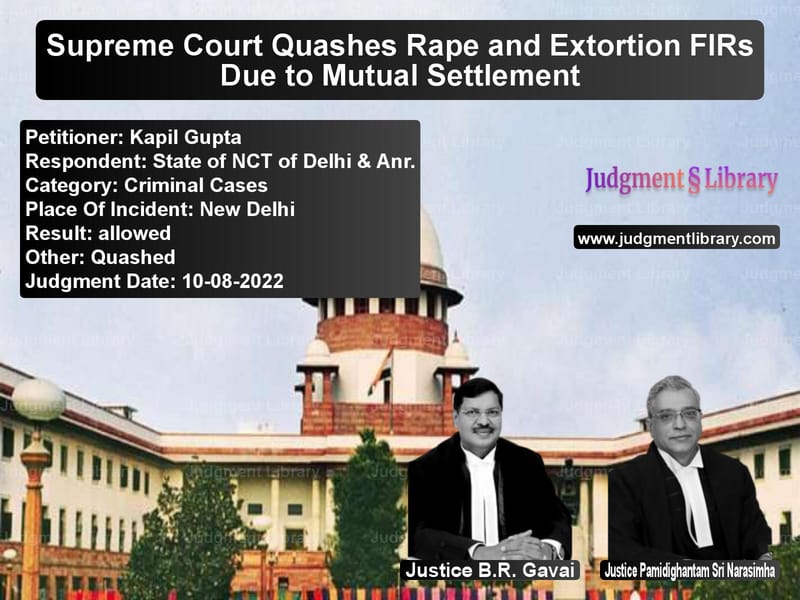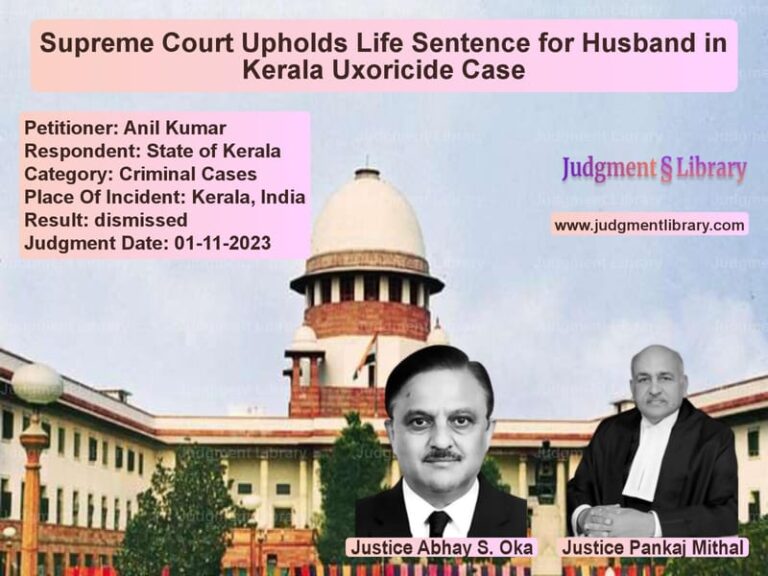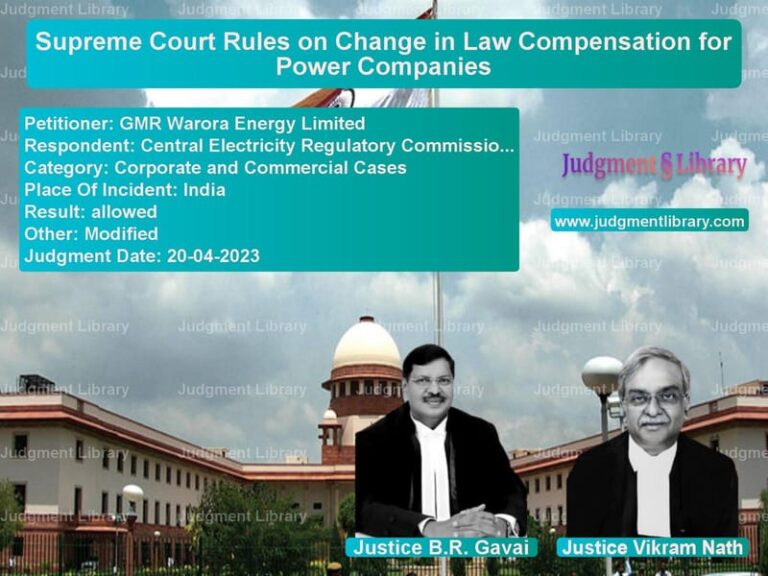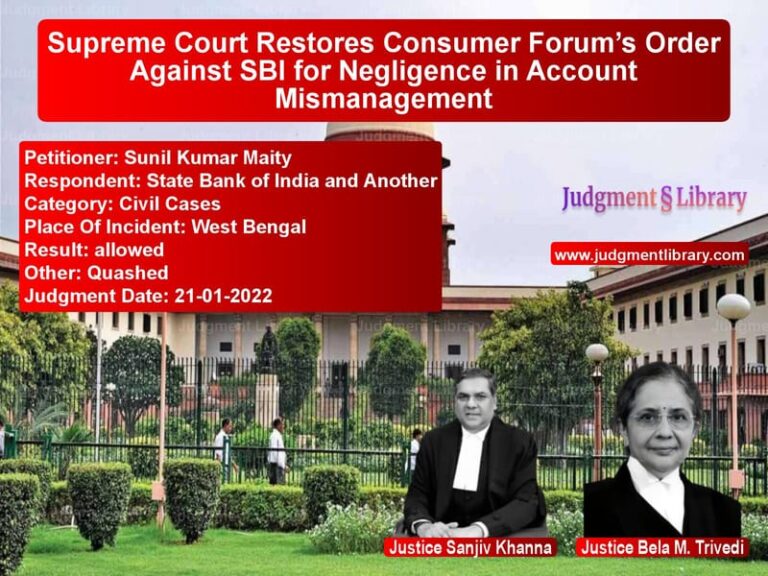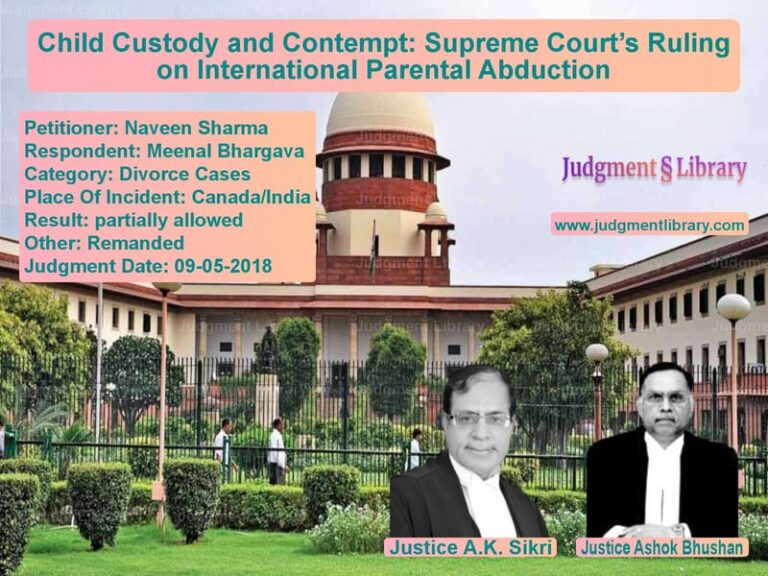Supreme Court Quashes Rape and Extortion FIRs Due to Mutual Settlement
The case revolves around the appellant, Kapil Gupta, and the respondent, a young woman, where two FIRs—one for rape and another for extortion—were lodged against each other. The appellant approached the Supreme Court after the Delhi High Court refused to quash the proceedings despite a mutual settlement between the parties.
Background of the Case
On 25 August 2020, an FIR (No. 569/2020) was lodged against the appellant under Section 376 of the Indian Penal Code (IPC), alleging that he had raped the complainant after she invited him to her house. The complainant stated that she had met with an accident in February 2020, which left her financially and physically distressed. While searching for a job, she came across the appellant, who was looking for a personal assistant. According to the complaint, after some messages were exchanged, she invited him to her house, where the alleged incident took place.
Subsequently, the appellant lodged another FIR (No. 824/2020) against the complainant, accusing her of extortion. Both cases were investigated, and charge sheets were filed. During the pendency of these cases, the parties mutually decided to settle the matter and approached the Delhi High Court for quashing the criminal proceedings. However, the High Court declined to quash the cases, citing the gravity of the offenses.
Arguments Before the Supreme Court
Petitioner’s Arguments (Kapil Gupta)
- The appellant argued that the complainant had voluntarily agreed to quash the proceedings and that continuing the trial would serve no purpose.
- It was contended that since both parties had settled their disputes amicably, forcing a trial upon them would only lead to unnecessary harassment.
- The appellant emphasized that the complainant had provided written consent for quashing the FIR and wished to move on with her life.
Respondent’s Arguments (State and Complainant)
- The Additional Solicitor General (ASG), representing the State, argued that rape is a heinous crime and quashing an FIR based on a settlement could set a dangerous precedent.
- It was contended that crimes like rape are offenses against society and cannot be compromised between two individuals.
- The complainant’s advocate, however, confirmed that the complainant had voluntarily consented to quash the FIR and wished to avoid the trauma of a prolonged trial.
Supreme Court’s Observations
The Supreme Court acknowledged that rape is a serious crime that cannot ordinarily be quashed based on a settlement. However, it also took into account the specific facts of the case and the complainant’s willingness to withdraw her allegations.
Read also: https://judgmentlibrary.com/supreme-court-sets-aside-conviction-in-karnataka-murder-case/
The Court referred to the ruling in Narender Singh v. State of Punjab (2014), which held that while heinous crimes should not be quashed on the basis of a settlement, courts have the discretion to do so in exceptional cases where the possibility of conviction is bleak, and the continuation of proceedings would cause injustice.
The Court observed:
“Since the respondent has voluntarily agreed to put an end to these proceedings, forcing her to go through the trauma of a trial would not serve the ends of justice.”
The bench further noted that the complainant was a 23-year-old woman who wished to live in peace and avoid the social stigma and distress of continued litigation.
The Court held:
“Though ordinarily, in heinous offenses like rape, proceedings should not be quashed on the basis of a settlement, given the peculiar circumstances of this case, the extraordinary powers of this Court can be exercised to put an end to the criminal proceedings.”
Supreme Court’s Verdict
Considering the specific facts and circumstances, the Supreme Court quashed the proceedings in both FIRs:
- FIR No. 569/2020 (Rape case at Mehrauli Police Station)
- FIR No. 824/2020 (Extortion case at Mehrauli Police Station)
The Court also commended the efforts of the ASG and the Amicus Curiae for ensuring that the complainant’s consent was genuine and free from coercion.
Impact of the Judgment
This ruling provides a nuanced approach to cases involving settlement in serious offenses:
- It reiterates that rape cases should generally not be quashed based on compromise but allows exceptions in specific circumstances.
- It ensures that the complainant’s well-being and autonomy are taken into account while deciding the fate of criminal proceedings.
- It prevents unnecessary litigation when both parties genuinely wish to end the dispute.
The decision balances the principles of justice and practicality, ensuring that legal proceedings do not become an instrument of harassment for either party.
Petitioner Name: Kapil Gupta.Respondent Name: State of NCT of Delhi & Anr..Judgment By: Justice B.R. Gavai, Justice Pamidighantam Sri Narasimha.Place Of Incident: New Delhi.Judgment Date: 10-08-2022.
Don’t miss out on the full details! Download the complete judgment in PDF format below and gain valuable insights instantly!
Download Judgment: kapil-gupta-vs-state-of-nct-of-delh-supreme-court-of-india-judgment-dated-10-08-2022.pdf
Directly Download Judgment: Directly download this Judgment
See all petitions in Fraud and Forgery
See all petitions in Bail and Anticipatory Bail
See all petitions in Judgment by B R Gavai
See all petitions in Judgment by P.S. Narasimha
See all petitions in allowed
See all petitions in Quashed
See all petitions in supreme court of India judgments August 2022
See all petitions in 2022 judgments
See all posts in Criminal Cases Category
See all allowed petitions in Criminal Cases Category
See all Dismissed petitions in Criminal Cases Category
See all partially allowed petitions in Criminal Cases Category

